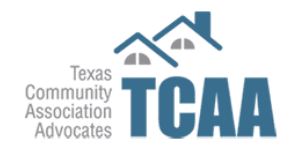Let’s talk about a journey no Homeowners Association (HOA) board member or community developer ever wants to embark on: the dreaded HOA lawsuit.
If you’re steering the ship of a community in Dallas or Houston, or charting the course for a new development, the words can send a shiver down your spine. It feels like an unexpected ambush in the otherwise noble pursuit of community building, doesn’t it?
But here’s the good news: like any challenging task, understanding the rules, common pitfalls and best strategies can make all the difference. This isn’t about fearmongering: it’s about equipping you with the knowledge to navigate these choppy waters confidently and ultimately, to foster a thriving, harmonious community where lawsuits are a distant thought — not an imminent threat.
Let’s explore the landscape of HOA lawsuits, understand why they happen, what the stakes are, and most importantly, how you can champion your community by minimizing these risks. Think of it as a strategy guide to keeping your HOA thriving in success and collaboration.
Can You File a Lawsuit Against Your HOA?
Let’s get this foundational question out of the way. From a homeowner’s perspective, or even that of a vendor or employee, the answer is a clear yes. An HOA is a legal entity, typically a non-profit corporation in Texas, and like any other corporation, it can sue and be sued.
When homeowners buy into a community with an HOA, they enter into a contractual agreement, usually outlined in the Covenants, Conditions, and Restrictions (CC&Rs). If homeowners believe the HOA has failed to uphold its end of this agreement or has acted improperly, they often have legal avenues to pursue. Similarly, disputes with vendors or employment-related issues can also escalate to legal action.
For board members and developers, understanding this fundamental point is crucial. It underscores the importance of diligent governance and proactive risk management.
The Most Common Reasons HOAs Are Sued
Every story has its recurring plot points, and in HOA litigation, certain themes emerge more frequently than others. Knowing these common triggers is like recognizing the early warning signs — it gives you a chance to change the outcome.
Breach of Contract or Fiduciary Duty
This is a big one. Your HOA’s governing documents (CC&Rs, bylaws, rules, and regulations) form a contract with the homeowners. If the HOA fails to perform its duties as outlined — like maintaining common areas (a leaky roof in the clubhouse that never gets fixed, for example), or not enforcing rules consistently — homeowners might sue.
Board members also have a fiduciary duty to act in the best interests of the community, with care and good faith. Actions perceived as self-serving or negligent can lead to lawsuits.
Mismanagement of Funds
Financial stewardship is a critical quest for any HOA board. Allegations of mismanagement, such as embezzlement, improper use of reserve funds, or a lack of transparency in financial dealings, are serious and can quickly escalate to legal battles. Clear, auditable financial practices are your best shield here.
Housing Discrimination
HOAs must comply with fair housing laws, such as the federal Fair Housing Act and Texas Fair Housing Act. Lawsuits can arise from claims of discrimination based on race, color, religion, sex, familial status, national origin, or disability. This could involve selective rule enforcement, denial of reasonable accommodations for disabled residents, or harassment.
Failure to Maintain Common Areas
This often ties into breach of contract but deserves its own mention. If the HOA neglects its responsibility to maintain common areas (pools, landscaping, roads, etc.), and this neglect leads to property damage or, worse, personal injury, lawsuits are a likely consequence. Imagine a resident tripping on a broken sidewalk that’s been reported multiple times – that’s a lawsuit waiting to happen.
Improper Rule Enforcement or Overreach
While enforcing rules is a key HOA function, doing so unfairly, inconsistently, or in a way that exceeds the HOA’s authority can lead to legal challenges. If a board suddenly starts fining residents for HOA violations that were previously ignored without proper notice, or creates new, restrictive rules that weren’t voted on according to the bylaws, they’re treading on thin ice.
Architectural Review Disputes
Disagreements over architectural changes or modifications are a frequent source of friction. If a homeowner believes the architectural review committee (ARC) has been arbitrary, unfair, or inconsistent in its decisions, they might pursue legal action.
Improper Foreclosure Actions
While HOAs in Texas do have the power to place liens and foreclose on properties for unpaid assessments, these actions must strictly adhere to legal procedures. Any misstep in this process can result in a wrongful foreclosure lawsuit.
Lack of Transparency or Due Process
Homeowners have a right to understand how their HOA is operating and to be treated fairly. Failing to provide access to records, holding closed meetings improperly, or levying fines and penalties without due process can all become grounds for a lawsuit.
Understanding these common “plot twists” allows you to proactively write a different story for your community.
What Happens When an HOA Loses a Lawsuit
Losing a lawsuit isn’t just a minor setback; it can be a critical failure with far-reaching consequences for the HOA and its members. Think of it as facing a tough boss battle unprepared — the results can be devastating.
Significant Financial Drain
This is often the most immediate and painful impact. Losing an HOA lawsuit can mean paying:
- Legal Fees: Both for the HOA’s own defense and potentially the plaintiff’s legal costs if ordered by the court.
- Monetary Judgments or Settlements: These can range from relatively small amounts for minor breaches to substantial sums for damages, especially in cases of negligence or discrimination.
- Special Assessments: To cover these unexpected costs, the HOA might be forced to levy special assessments on all homeowners, which is never popular and can cause further dissent.
- Increased Insurance Premiums: A lawsuit, particularly a lost one, can make it harder and more expensive to obtain or renew essential insurance policies like Directors & Officers (D&O) liability coverage.
Court-Ordered Actions & Mandates
A court can order the HOA to take specific actions, such as:
- Reversing a decision (e.g., approving a disputed architectural change).
- Performing specific repairs or maintenance.
- Changing its rules or policies.
- In extreme cases of mismanagement or deadlock, a court might even appoint an outside receiver to manage the HOA’s affairs.
Reputational Damage
Lawsuits erode trust within the community. Homeowners may lose faith in the board’s ability to govern effectively and fairly. This can make it difficult to recruit volunteer board members, pass necessary initiatives, and maintain a positive community atmosphere. For developers, litigious community association management in a new community can be a significant deterrent to potential buyers.
Impact on Property Values
Ongoing legal battles and the financial instability they can create may negatively affect property values within the community.
While D&O insurance can offer some protection for board members from personal liability, it’s not a blank check. Policies have limits and exclusions, and a history of lawsuits can make coverage prohibitively expensive or even unavailable. The best “defense” is always proactive prevention.
9 Ways to Minimize Risks of an HOA Lawsuit
The good news is that you’re not powerless! Like a seasoned player learning a game’s tricks and traps, HOA boards and developers can take concrete steps to significantly reduce the risk of facing an HOA lawsuit.
This is where your leadership truly shines, transforming potential conflict into a well-managed community narrative.
- Master Your Governing Documents: Your CC&Rs, bylaws, and rules are the foundational texts of your community. Board members must understand them thoroughly and ensure all actions and decisions are consistent with these documents. If they’re outdated or ambiguous, work with legal counsel to amend them properly.
- Fair and Consistent Enforcement: Apply rules and penalties uniformly to all residents. Selective enforcement is a fast track to discrimination claims and general discontent. Maintain clear records of violations and enforcement actions.
- Embrace Transparency: Conduct open board meetings (as required by Texas law), provide homeowners with reasonable access to financial records and meeting minutes, and communicate clearly and regularly about HOA decisions and activities. An informed community is generally a more understanding and cooperative one.
- Practice Sound Financial Management: Implement strong internal controls for handling HOA funds. Develop clear budgets, conduct regular financial reviews or audits (as per your governing documents or best practices), maintain adequate reserve funds, and never commingle operating and reserve funds.
- Secure Adequate Insurance: This is non-negotiable. Maintain comprehensive general liability insurance, property insurance for common areas, and critically, Directors & Officers (D&O) liability insurance to protect board members from personal liability for their decisions made in good faith. A fidelity bond to protect against theft or embezzlement by those handling funds is also wise. Regularly review your coverage to ensure it’s adequate for your community’s size and risks.
- Prioritize Common Area Maintenance: Develop and follow a regular maintenance schedule for all common areas and amenities. Address repair needs promptly. This not only prevents lawsuits related to negligence or injury but also maintains property values and resident satisfaction.
- Follow Due Process & Legal Counsel: For any enforcement action, fine, lien, or foreclosure, ensure you are meticulously following the procedures outlined in your governing documents and Texas law. When in doubt, always consult with an attorney specializing in HOA law. This is particularly crucial for complex issues.
- Establish Clear Dispute Resolution Procedures: Sometimes, disputes are inevitable. Having a formal, clear process for homeowners to voice grievances and for the board to address them can prevent minor issues from escalating into major lawsuits. Consider alternative dispute resolution (ADR) methods like mediation.
- Invest in Board Member Education: Ensure board members understand their roles, responsibilities and particularly their fiduciary duties. Many resources and training programs are available for HOA board members.
By implementing these strategies, you’re not just avoiding lawsuits — you’re building a stronger, more resilient, and more harmonious community.
SBB Management | Helping Rewrite the Story on HOA Lawsuits
Navigating the complex world of HOA governance, especially in dynamic regions like Dallas and Houston, can often feel like you’ve been dropped into an advanced-level game with a rulebook written in ancient runes. The threat of an HOA lawsuit can loom like a final boss, but you don’t have to face it alone.
This is where partnering with a professional homeowners association management company, like SBB Community Management, becomes your most strategic move. Think of us as the experienced guide who has successfully navigated this terrain countless times. We bring the expertise, tools, and dedicated support to help your community avoid the common pitfalls that lead to HOA lawsuits and instead focus on building a vibrant and well-run association.
How can SBB Community Management help you steer clear of legal trouble and ensure your community’s story is one of peace and prosperity?
- Expert Knowledge of Texas HOA Law: We stay current with the ever-evolving landscape of Texas property codes and HOA regulations, providing your board with the guidance needed to operate confidently within legal boundaries in both Dallas and Houston.
- Professional Financial Stewardship: With SBB, you gain robust accounting practices, transparent financial reporting, assistance with budget preparation, and meticulous reserve fund planning. This diligence is key to preventing claims of mismanagement.
- Guidance on Fair & Consistent Rule Enforcement: We can help you develop and implement fair enforcement policies and procedures, ensuring due process and reducing the risk of claims related to discrimination or arbitrary actions.
- Proactive Maintenance & Vendor Management: Our team helps oversee the maintenance of common areas, ensuring they are safe and well-kept. We also assist in vetting and managing vendors, ensuring contracts are sound and services are delivered as promised.
- Enhanced Communication & Dispute Resolution: SBB can facilitate clear and consistent communication with homeowners, manage official records, and help implement effective dispute resolution processes to address concerns before they escalate.
- Supporting Board Member Duties: We provide resources and support to help board members understand and fulfill their fiduciary duties, empowering you to make informed decisions that protect the association and its members.
Choosing to partner with HOA Management services like SBB is more than just a defensive strategy against HOA lawsuits, it’s an investment in your community’s future. It’s about dedicating your valuable volunteer time to vision and leadership, while we handle the complex operational and administrative quests.
Together, we can write a story of your Dallas or Houston community that’s free from the drama of lawsuits and filled with the rewards of a well-managed, thriving neighborhood. Ready to change the script? Let’s talk about how SBB Community Management can help your HOA achieve its “happily ever after” today!





